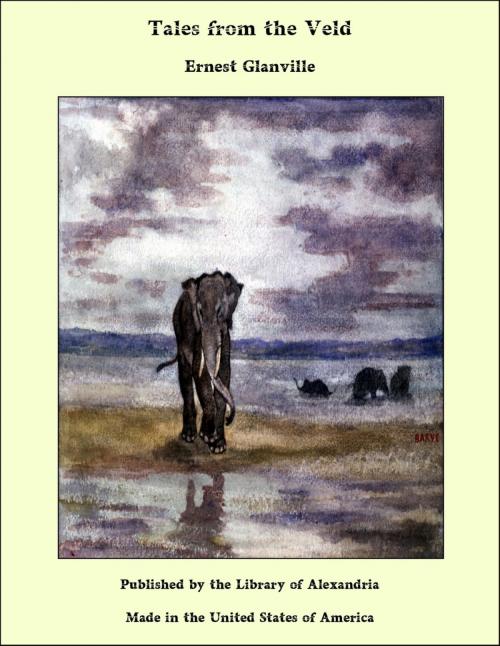| Author: | Ernest Glanville | ISBN: | 9781465628060 |
| Publisher: | Library of Alexandria | Publication: | March 8, 2015 |
| Imprint: | Language: | English |
| Author: | Ernest Glanville |
| ISBN: | 9781465628060 |
| Publisher: | Library of Alexandria |
| Publication: | March 8, 2015 |
| Imprint: | |
| Language: | English |
Abe Pike—Old Abe Pike, or Uncle Abe as he was variously called—lived in a one-horse shanty in the division of Albany, Cape Colony. I won’t locate his farm, for various reasons, beyond saying that there is a solitary blue-gum on the south side of the house and the rudiments of a cowshed on the north. Uncle Abe was not ambitious; he was slow, but he was sure. So he said. One blue-gum satisfied him, and as for the cowshed he meant to complete it during the century. I don’t introduce him as a tree planter, but as a narrator of most extraordinary yarns. He called them facts—but of the truth of this the reader may judge. Riding over one warm afternoon, I found him leaning over a water-butt examining the little lively and red worms therein, which would soon hatch out into livelier mosquitoes. “Well, Uncle, how d’ye fare?” “Porly, lad, porly; pumpkins is scarce.” Uncle Abe took a very old pipe from his pocket, and showed the emptiness of it by placing a very gnarled little finger into the black bowl. I held out my pouch. “I’ll jest take a little dry to put on the top,” he said, as he deliberately filled the pipe. “We want a little ‘dry on the top’ to start us, but if there’s nothin’ deown below, why, it’s a puff and out it goes. Yo’ll never get a crop from that bottom land o’ yours until you put some dry on the top in the shape of manure. See!” Now, of all the laziest, shiftless beings there was no one who could start level with old Abe Pike, and this advice from him was rasping, but still he had his points. “I’ve heard say there’s a powerful heap o’ money in portents,” he ventured presently. “It depends on how you interpret them.” “Well, that’s so. I’ve got a portent here in this very coat; that’s some small pumpkins, I tell you. It’ll kill any sort o’ vermin, rats, skeeters, wild-cats, jackals, quicker’n winkin’. See! I found it out myself come next Friday fortnight.” “You mean you interpreted the portent.” “Well, now, is that so? I tole you I got it in my pocket, and ef I didn’t find it, how did it get there? That’s what I want to know.” “All right, Uncle, what is it?” “That’s my portent. I diskivered it, and I’m gwine to work it under my name—Abe Pike’s Sure Killer.” “Is it a patent medicine you’re talking of?” “Of course; that’s what I said. There it is,” and out of his pocket he produced a strip of bark. “Sneeze-wood bark, isn’t it?” “Looks like it, don’t it? But there’s bark and there’s bark. This is Abe Pike’s Bark, possessing properties which will alleviate the sufferings of the human race by putting a lightning end to the enemies of the human kind. That’s what I’ve studied out to put in the papers in big letters. There’s money in it, now; ain’t there?” “I don’t see it, Uncle.” “Ah! the limitations of knowledge, my boy, is accountable for a pot of ignorance. You think that’s plain ordinary bark, but that’s where your limitations run dry. I’ll jes’ tell you how I diskivered this great and marvellous killer of the centry. Come Friday fortnight I sot out with the axe to chop out a pole for the cowshed—t’other on’ been eaten thro’ by those plaguy ants. Well, I knew of a tree way down in the kloof that had been growin’ for that shed o’ mine ever since the seed dropped on the ’xact spot where nature had provided a bed for it. When you come to think of it, everything has got its purpose all smoothed out from the start, and that little seed spread itself out from the beginnin’ to build up a pole for ole Abe Pike’s cowshed. I sot down on a fallen tree and thought that all out, while the trees round about made a whisperin’ with their leaves over the head o’ that there sneeze ’ood that was doomed so to speak, by reason o’ my cows, and the necessity of keepin’ ’em out o’ the rain in the winter. Well, I sot there thinking all these thoughts until it was too dark, and I went away home ’thout having cut the tree. Next mornin’ I took up my axe and went down into the kloof and took off my coat. I gave two blows and stopped.”
Abe Pike—Old Abe Pike, or Uncle Abe as he was variously called—lived in a one-horse shanty in the division of Albany, Cape Colony. I won’t locate his farm, for various reasons, beyond saying that there is a solitary blue-gum on the south side of the house and the rudiments of a cowshed on the north. Uncle Abe was not ambitious; he was slow, but he was sure. So he said. One blue-gum satisfied him, and as for the cowshed he meant to complete it during the century. I don’t introduce him as a tree planter, but as a narrator of most extraordinary yarns. He called them facts—but of the truth of this the reader may judge. Riding over one warm afternoon, I found him leaning over a water-butt examining the little lively and red worms therein, which would soon hatch out into livelier mosquitoes. “Well, Uncle, how d’ye fare?” “Porly, lad, porly; pumpkins is scarce.” Uncle Abe took a very old pipe from his pocket, and showed the emptiness of it by placing a very gnarled little finger into the black bowl. I held out my pouch. “I’ll jest take a little dry to put on the top,” he said, as he deliberately filled the pipe. “We want a little ‘dry on the top’ to start us, but if there’s nothin’ deown below, why, it’s a puff and out it goes. Yo’ll never get a crop from that bottom land o’ yours until you put some dry on the top in the shape of manure. See!” Now, of all the laziest, shiftless beings there was no one who could start level with old Abe Pike, and this advice from him was rasping, but still he had his points. “I’ve heard say there’s a powerful heap o’ money in portents,” he ventured presently. “It depends on how you interpret them.” “Well, that’s so. I’ve got a portent here in this very coat; that’s some small pumpkins, I tell you. It’ll kill any sort o’ vermin, rats, skeeters, wild-cats, jackals, quicker’n winkin’. See! I found it out myself come next Friday fortnight.” “You mean you interpreted the portent.” “Well, now, is that so? I tole you I got it in my pocket, and ef I didn’t find it, how did it get there? That’s what I want to know.” “All right, Uncle, what is it?” “That’s my portent. I diskivered it, and I’m gwine to work it under my name—Abe Pike’s Sure Killer.” “Is it a patent medicine you’re talking of?” “Of course; that’s what I said. There it is,” and out of his pocket he produced a strip of bark. “Sneeze-wood bark, isn’t it?” “Looks like it, don’t it? But there’s bark and there’s bark. This is Abe Pike’s Bark, possessing properties which will alleviate the sufferings of the human race by putting a lightning end to the enemies of the human kind. That’s what I’ve studied out to put in the papers in big letters. There’s money in it, now; ain’t there?” “I don’t see it, Uncle.” “Ah! the limitations of knowledge, my boy, is accountable for a pot of ignorance. You think that’s plain ordinary bark, but that’s where your limitations run dry. I’ll jes’ tell you how I diskivered this great and marvellous killer of the centry. Come Friday fortnight I sot out with the axe to chop out a pole for the cowshed—t’other on’ been eaten thro’ by those plaguy ants. Well, I knew of a tree way down in the kloof that had been growin’ for that shed o’ mine ever since the seed dropped on the ’xact spot where nature had provided a bed for it. When you come to think of it, everything has got its purpose all smoothed out from the start, and that little seed spread itself out from the beginnin’ to build up a pole for ole Abe Pike’s cowshed. I sot down on a fallen tree and thought that all out, while the trees round about made a whisperin’ with their leaves over the head o’ that there sneeze ’ood that was doomed so to speak, by reason o’ my cows, and the necessity of keepin’ ’em out o’ the rain in the winter. Well, I sot there thinking all these thoughts until it was too dark, and I went away home ’thout having cut the tree. Next mornin’ I took up my axe and went down into the kloof and took off my coat. I gave two blows and stopped.”









![Cover of the book Rocky Mountain [Colorado] National Park by Ernest Glanville](https://www.kuoky.com/images/2015/march/300x300/9781465508690-kJJ6_300x.jpg)





